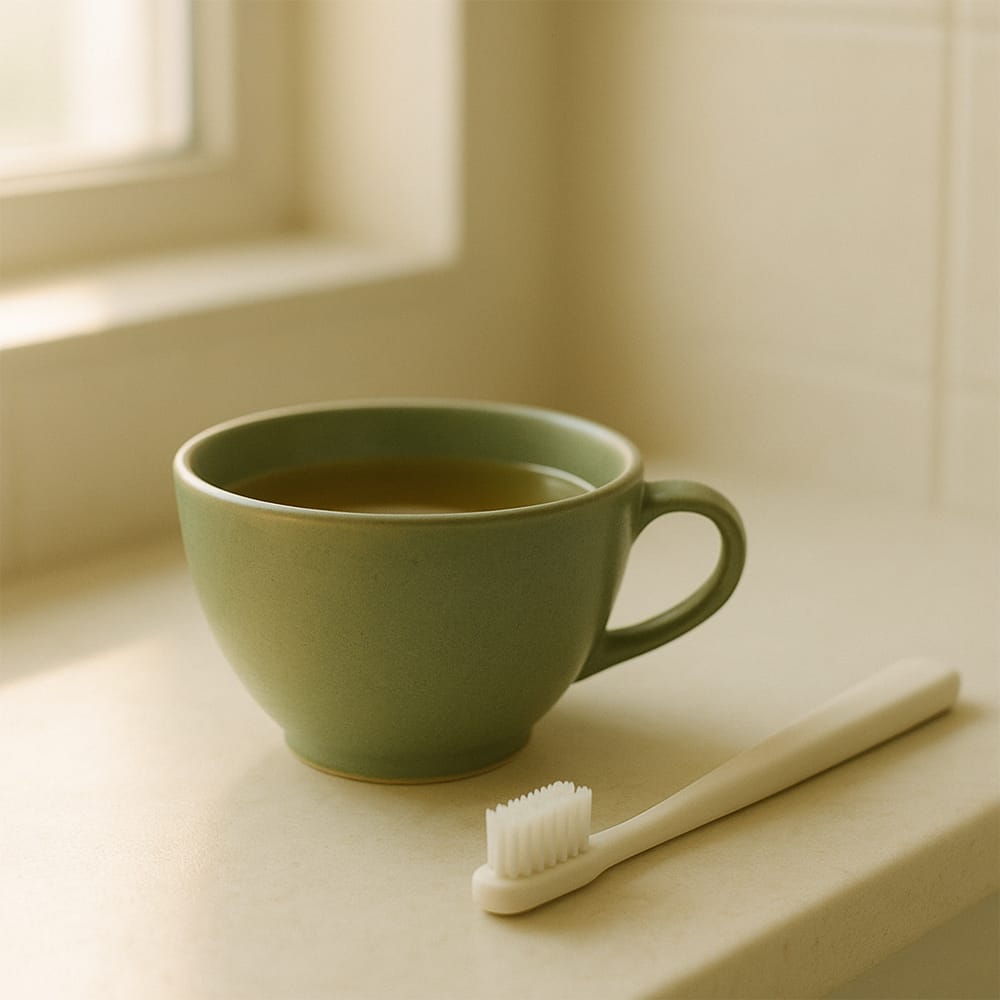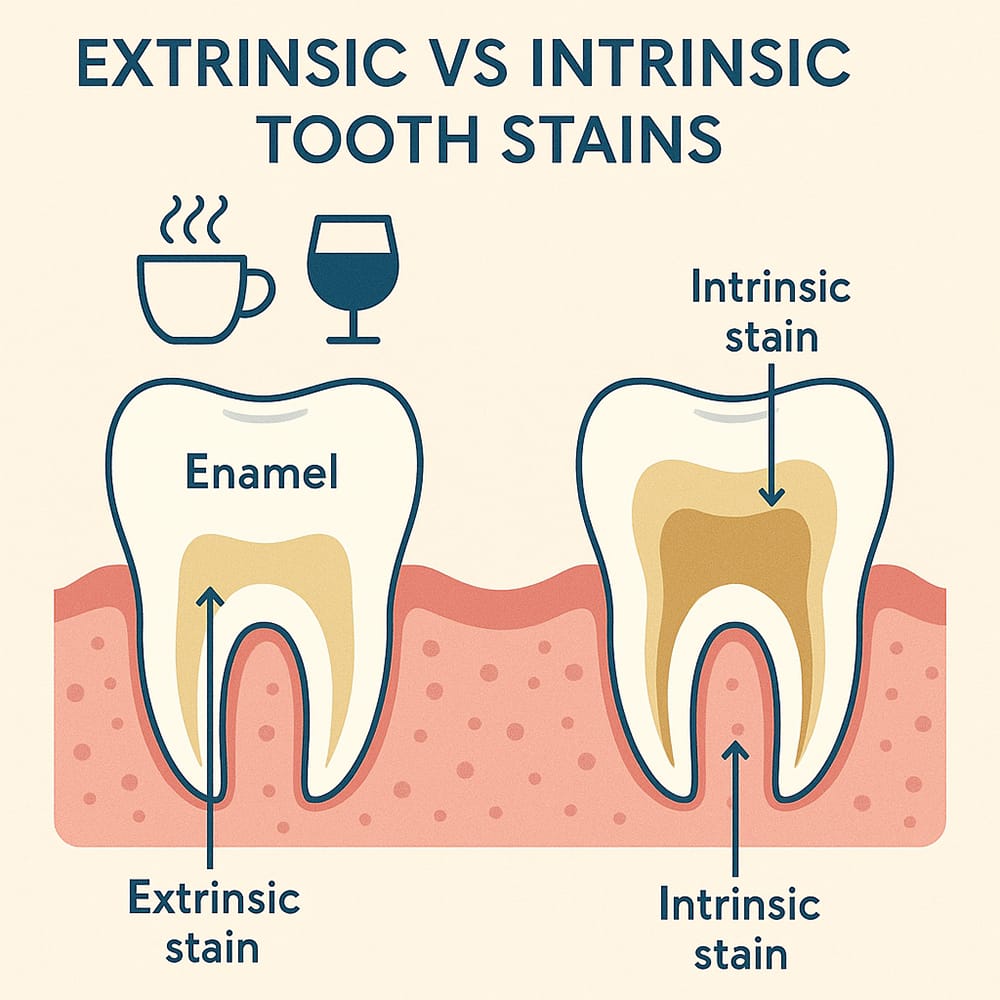Introduction
Green tea has earned a loyal following across the globe for its refreshing taste and powerful health benefits. From boosting metabolism to fighting inflammation, it’s often considered a go-to wellness drink. However, one question continues to stir curiosity among regular tea drinkers—does green tea stain your teeth?
As people move away from sugary sodas and acidic coffees, green tea has become the preferred alternative. But despite its positive reputation, concerns about dental discoloration remain. Many ask, “If black tea and coffee can stain, then does green tea stain your teeth too?”
This article dives deep into the truth behind the question does green tea stain your teeth, offering science-backed facts, expert insights, and actionable prevention tips. If you’re a daily tea lover worried about keeping your teeth white, this is your ultimate guide.

What Causes Teeth Stains?
To understand the concern behind the question does green tea stain your teeth, we must first look at how tooth staining actually occurs. Teeth can develop discoloration for several reasons—some temporary and some more permanent.

Types of Stains on Teeth
There are mainly two categories of tooth stains: extrinsic and intrinsic.
Extrinsic Stains
These occur on the surface of the teeth (the enamel) and are usually caused by food, drinks, and lifestyle habits. Beverages like red wine, coffee, and green tea contain compounds that attach to enamel and lead to visible discoloration.
Intrinsic Stains
These stains go deeper into the tooth structure, beneath the enamel. They are more difficult to remove and often result from medication, excessive fluoride intake, or trauma to the tooth. Although green tea doesn’t cause intrinsic staining, its long-term exposure can contribute to surface-level discoloration.
How Do Beverages Contribute to Staining?
Pigments in drinks are known as chromogens. These molecules latch onto enamel and build up over time. Additionally, tannins—naturally present in tea—can increase the enamel’s stickiness, allowing more chromogens to cling to your teeth.
This brings us back to the question: does green tea stain your teeth as much as coffee or black tea? The answer lies in its composition, which we’ll cover next. But in short, while green tea does contain stain-causing compounds, its effects are typically milder compared to darker drinks.
Green Tea Composition and How It Affects Your Teeth
To answer the question does green tea stain your teeth, we must take a close look at what’s inside your cup. Green tea contains several natural compounds that influence how it interacts with your teeth.

Catechins and Polyphenols
Catechins are antioxidant-rich compounds in green tea known for their ability to fight bacteria and reduce inflammation. These can actually support oral health by reducing plaque buildup. But while they’re beneficial overall, catechins don’t significantly influence the staining process.
On the other hand, polyphenols—specifically tannins—are more relevant to staining concerns.
The Role of Tannins in Tooth Discoloration
Tannins are naturally occurring substances that contribute to the color and flavor of tea. Unfortunately, they also help chromogens bind to your enamel. This leads us to the root of the concern—does green tea stain your teeth because of tannins?
Yes, but not as severely as black tea or coffee. Green tea contains fewer tannins than those darker beverages, making it a better choice if you’re concerned about tooth color.
Matcha vs. Regular Green Tea
Matcha, a concentrated form of green tea made from powdered whole leaves, contains higher amounts of tannins and pigments. If you’re wondering, “does green tea stain your teeth more in matcha form?”—the answer is yes. Because matcha is more concentrated, it can potentially stain more than steeped green tea, especially if consumed frequently without rinsing or brushing afterward.
Why Green Tea May Still Be a Safer Option
Despite these concerns, green tea stains your teeth far less than coffee or black tea. In fact, its lower acidity means it doesn’t weaken your enamel as quickly, reducing the chances of deeper, more permanent stains. Plus, its antibacterial effects can promote healthier gums and fresher breath.
Scientific Research: What Studies Say About Green Tea and Tooth Staining
The question does green tea stain your teeth has been examined through multiple dental studies, and the results offer a mix of caution and reassurance.
Clinical Study: Comparing Beverage Staining Effects
A published study in the Journal of Oral Science compared the staining potential of several beverages, including green tea, coffee, and black tea. Human enamel samples were exposed to each drink under controlled conditions.
The findings? Green tea did stain the enamel, but the discoloration was significantly lighter than that caused by coffee or black tea. In other words, if you’re drinking green tea for its health benefits, you’re far better off than a heavy coffee drinker in terms of tooth color.
Study on Tannins and Enamel Adhesion
Another laboratory study investigated how tannins bind to tooth enamel. Researchers found that green tea’s lower tannin concentration causes slower and milder staining compared to darker teas.
But the question remains—does green tea stain your teeth over time even if the immediate staining is light? Yes, with repeated exposure and poor dental hygiene, green tea can gradually dull the whiteness of your teeth.
Long-Term Effects on Daily Drinkers
In a six-month observational study, daily green tea consumers were monitored for visible changes in tooth color. Those who followed proper oral hygiene—brushing after tea, rinsing with water, and using fluoride toothpaste—experienced minimal to no visible staining. Meanwhile, participants who ignored post-drink care saw noticeable yellowing over time.
Green Tea’s Protective Role
Interestingly, green tea also shows antibacterial and anti-inflammatory properties, which help reduce plaque buildup and protect gums. So while the concern does green tea stain your teeth holds some truth, it’s balanced by oral health benefits that few other beverages offer.
How to Prevent Green Tea Stains on Your Teeth
By now, you might be thinking: if the answer to does green tea stain your teeth is yes, should I stop drinking it? Fortunately, the answer is no. With the right techniques, you can enjoy your favorite drink without risking tooth discoloration.

Maintain Consistent Oral Hygiene
The first line of defense is always your daily dental routine. Brushing your teeth twice a day with fluoride toothpaste removes surface pigments left by green tea. Flossing once a day ensures that no tea residue or pigment is trapped between teeth.
Regular use of an alcohol-free mouthwash can also reduce plaque and rinse away leftover tannins that might contribute to stains.
Rinse With Water After Drinking
One of the easiest and most effective habits you can build is rinsing your mouth with water immediately after consuming green tea. This simple step helps flush out tannins and prevents them from settling into enamel.
It’s especially helpful if you don’t have immediate access to a toothbrush.
Use a Straw Whenever Possible
If you often drink iced green tea, use a straw. This reduces direct contact between the tea and your front teeth, where stains are most visible. While this doesn’t fully eliminate the exposure, it lowers the intensity of discoloration.
This tip is particularly useful if you’re wondering, does green tea stain your teeth if you drink it cold? — Yes, but using a straw reduces the impact.
Avoid Sugar and Lemon Additions
Sugar increases plaque buildup and lemon increases acidity—both of which enhance staining. Drinking plain green tea is not only healthier but also less likely to leave behind visible stains.
Get Regular Professional Cleanings
Even with good home care, plaque and minor stains can still build up over time. Visit your dentist every six months for cleanings. Let them know you drink green tea, so they can monitor for early signs of staining and give targeted advice.
Natural Remedies to Remove Green Tea Stains at Home
If you’re concerned that the answer to does green tea stain your teeth is yes, but want to avoid expensive whitening treatments, there are natural methods you can try at home. These remedies help minimize mild staining and maintain a brighter smile.
Brushing With Baking Soda
Baking soda is a mild abrasive that helps remove surface stains from enamel. You can make a paste using baking soda and a small amount of water, then gently brush your teeth 1–2 times a week.
Though effective, overuse may weaken enamel—so moderation is key. This method is often recommended for those who regularly ask, does green tea stain your teeth more than it should?
Hydrogen Peroxide Rinse
A diluted rinse made from equal parts hydrogen peroxide (3%) and water can help whiten your teeth naturally. Swish it for 30 seconds, spit it out, and rinse with clean water. Use this method no more than twice a week.
Oil Pulling With Coconut Oil
Oil pulling is an ancient Ayurvedic technique where oil is swished around the mouth to remove toxins. Coconut oil, known for its antibacterial properties, may help reduce the bacteria that bind with pigments in green tea.
Swish a tablespoon of coconut oil in your mouth for 10–15 minutes, then rinse with warm water and brush.
Apple Cider Vinegar (ACV) Dilution
Apple cider vinegar is acidic and can break down superficial stains. Mix one tablespoon with a cup of water, swish for 30 seconds, and rinse thoroughly with plain water. Limit use to once a week to prevent enamel erosion.
Whitening Toothpaste and Mouthwashes
While not strictly a “home remedy,” over-the-counter whitening products can help counteract the gradual effects of green tea on your teeth. Choose products with low abrasiveness and ADA approval.

Conclusion: Should You Be Worried About Green Tea Staining Your Teeth?
So, does green tea stain your teeth? The simple answer is yes—but only slightly, and certainly far less than darker, more acidic drinks like coffee or black tea. The presence of tannins and plant pigments in green tea can lead to mild surface staining, especially with frequent, unmonitored consumption.
However, the benefits of green tea—like its antibacterial properties, support for gum health, and low acidity—outweigh its minor drawbacks. Unlike coffee, green tea doesn’t erode enamel significantly, and its antioxidant content can actually enhance your oral hygiene when paired with proper care.
You don’t need to give up green tea to protect your smile. Instead, adopt some simple habits:
- Rinse with water after drinking
- Brush regularly and floss daily
- Limit added sugars and lemon
- Use a straw for iced green tea
- Visit your dentist for cleanings
By taking these steps, you can confidently enjoy green tea and still maintain a bright, healthy smile. The truth is, when it comes to the question does green tea stain your teeth, the answer depends more on your habits than the tea itself.
Since you have read the entire article, you can view this article: Matcha Milk Tea: 7 Amazing Benefits You’ll Love
Frequently Asked Questions About Green Tea and Teeth Staining
Does green tea stain your teeth?
Yes, green tea can mildly stain your teeth due to tannins, though less than coffee or black tea.
How can I prevent green tea stains?
Rinse after drinking, brush regularly, and avoid adding lemon or sugar to reduce stain risk.
Does green tea stain more than coffee?
No, green tea stains teeth less than coffee because of lower tannin and acidity levels.
Can I remove green tea stains naturally?
Yes, brushing with baking soda or oil pulling can help reduce mild green tea stains.
Does matcha stain teeth more than regular green tea?
Yes, matcha may stain more since it’s more concentrated and rich in tannins.
Is green tea good or bad for teeth?
Green tea helps reduce bacteria and plaque, but can still stain teeth if consumed often.
Does green tea stain your teeth if it’s iced?
Yes, cold or iced green tea can still stain teeth if consumed frequently.
Which teas don’t stain teeth?
Herbal teas like chamomile, peppermint, and rooibos usually don’t stain due to low tannin content.
Will drinking through a straw help?
Yes, using a straw reduces direct contact with teeth and lowers staining potential.
Should I stop drinking green tea for whiter teeth?
No, just follow good oral hygiene and limit heavy, frequent consumption.



